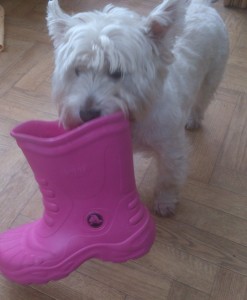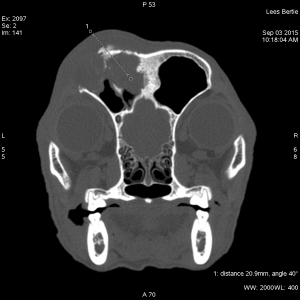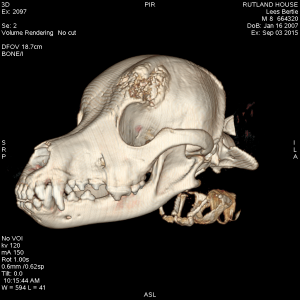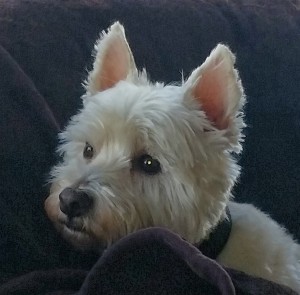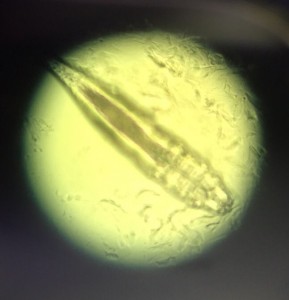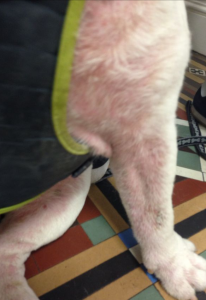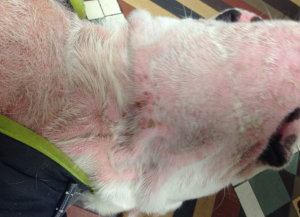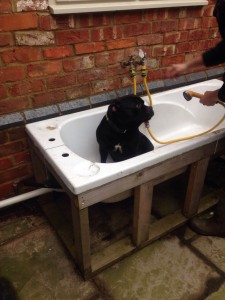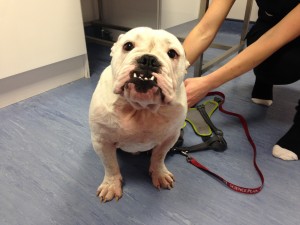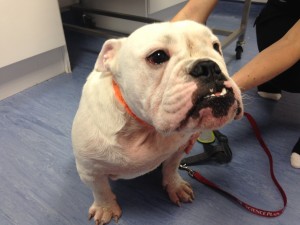Obesity is a growing concern in the UK with an increasing number of our pets becoming overweight. The additional weight puts extra strain on the entire body so here are 16 reasons your pet should get fit for 2016!
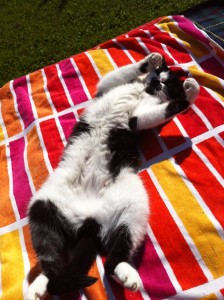 1) Reduced exercise tolerance; your animal with tire easily and be unable to perform their natural activities and behaviour.
1) Reduced exercise tolerance; your animal with tire easily and be unable to perform their natural activities and behaviour.
2) Unable to tolerate heat; an overweight animal is at higher risk of over heating come the Summer months.
3) Poor grooming; for an animal to groom themselves they need to be able to twist and bend in all directions, we have all seen the unusual positions they get themselves into! However, obese animals struggle with these movements leading to poor grooming and ultimately painful matted coats.
4) Additional strain on bones, joints and ligaments; Extra load and strain on your animals body will put extra forces on their musculoskeletal system. This can increase the risk of problems in the future and can exacerbate already existing conditions such as arthritis.
5) Heart strain; Additional weight puts additional work load on the heart. Fat can also infiltrate cardiac muscle cells affecting its function.
6) High blood pressure; overweight animals tend to have increased blood pressure. This leads to an increased work load on the heart too. Ultimately increased work load can lead to congestive heart failure.
7) Respiratory difficulty; generally being heavier means moving around becomes more difficult and strenuous. Additional fat in the chest and abdomen restricts the expansion of the lungs and so restricts the amount of oxygen your animal can take in within one breath.
8) Diabetes; obesity in cats is a known risk factor for the development of diabetes mellitus. Overweight animals will have extra glucose in their blood stream and therefore higher demands for insulin. High requirements for insulin can lead to insulin resistance and ultimately destruction of the cells that produce insulin. This results in Diabetes; a lifelong medical condition. In dogs, feeding fatty meals can predispose to pancreatitis which can also lead to destruction of insulin producing cells.
9) Liver disease; excessive fat can accumulate in the liver, a condition known as hepatic lipidosis. This can significantly affect liver function.
10) Reproductive problems; Overweight animals are prone to complications when delivering their young, this is often referred to as dystocia. This increases the risk of requiring medical or surgical intervention.
11) Incontinence; Incontinence develops due to weakening of the sphincter between the bladder wall and the urethra. When an overweight animal lies down they put more pressure on an already weakened sphincter which worsens the condition.
12) Immune system dysfunction; Obesity in animals has been associated with a poor immune system response to certain infections. The exact cause however is unknown.
13) Increased risk of developing cancer; the link between obesity and the development of certain cancer types has been found in some scientific studies.
14) Skin and anal gland issues; skin folds created by overweight dogs can lead to skin fold infections and discomfort. Fat accumulation around anal glands can also prevent natural emptying.
15) Increased surgical and anaesthetic risk; for many reasons it is not ideal to perform surgery on an overweight animal. If your animal is overweight and requires elective surgery we would recommend weight loss prior to this. However, in an emergency situation where the surgery cannot be delayed this can increase the risks to your animal.
 16) Quality and length of life; Obesity can significantly reduce the lifespan of your pet and can have a huge impact on the quality of their life too. We want our pets to be able to do the things they enjoy to do therefore keeping there weight to an ideal is really important.
16) Quality and length of life; Obesity can significantly reduce the lifespan of your pet and can have a huge impact on the quality of their life too. We want our pets to be able to do the things they enjoy to do therefore keeping there weight to an ideal is really important.
So next time your furry friend is giving you those ‘please feed me’ eyes say no! It really is in their best interests. They will soon start not to expect it from you and get distracted by something else! If you need advice on what to feed your pet or would like some helpful tips then please contact us on 01606 880 890.

